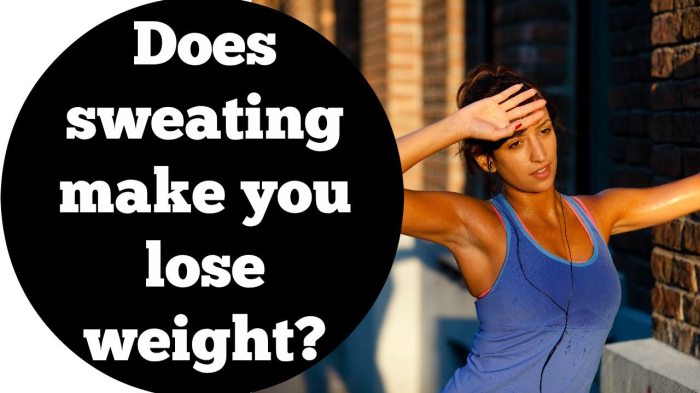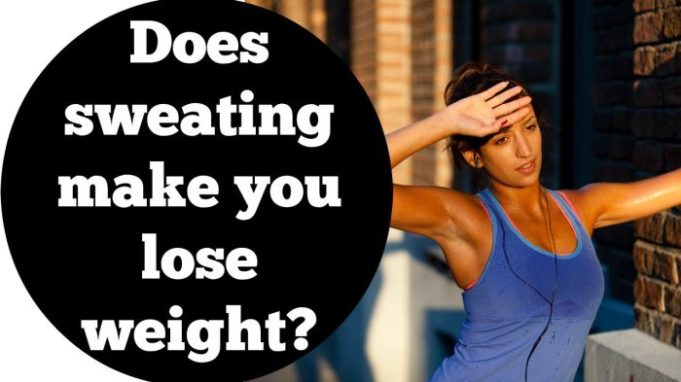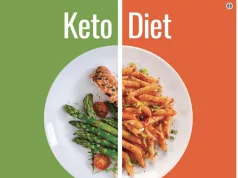Do you need to sweat to lose weight? This is a question many people ask, and the answer isn’t as simple as a yes or no. While sweating can be a sign of a good workout, it’s not the sole indicator of weight loss. It’s about understanding the complex interplay of exercise, diet, and other factors that contribute to achieving your weight goals.
Sweating is your body’s natural cooling mechanism, often triggered by physical activity, heat, or stress. While it’s true that you burn calories during exercise, the amount of sweat you produce doesn’t directly translate to the number of calories you’ve burned.
The Role of Sweat in Weight Loss

Sweating is a natural bodily process that helps regulate body temperature. While it’s often associated with exercise and weight loss, understanding the connection between sweat and calorie expenditure is crucial.
Sweating and Calorie Expenditure, Do you need to sweat to lose weight
Sweating is a physiological response to heat, primarily triggered by physical activity. When your body temperature rises, your sweat glands release sweat, which evaporates from your skin, taking heat with it. This cooling mechanism is essential for maintaining a healthy core temperature. However, sweating itself doesn’t directly burn calories.
The calories you burn are a result of the energy expenditure associated with the physical activity that caused you to sweat.
For example, running, cycling, or swimming all involve intense physical exertion, leading to increased body temperature and sweating. These activities require your body to work harder, burning more calories in the process.
Sweating During Exercise vs. Other Factors
While exercise is a common trigger for sweating, it’s important to differentiate between exercise-induced sweating and sweating due to other factors like heat or stress.
- Exercise-induced sweating is directly linked to physical activity and calorie expenditure. The more intense the exercise, the more you sweat, and the more calories you burn.
- Sweating due to heat is a response to high environmental temperatures. Even without exercise, your body will sweat to cool itself down in hot conditions. While this sweating does contribute to calorie expenditure, the amount is significantly less than that associated with exercise.
- Sweating due to stress is triggered by the release of hormones like adrenaline and cortisol. While this sweating can be intense, it doesn’t directly contribute to calorie burning.
Activities That Cause Significant Sweating
Many activities can cause significant sweating, leading to potential calorie burn.
- High-intensity interval training (HIIT) involves short bursts of intense exercise followed by brief recovery periods. This type of workout can significantly elevate your heart rate and body temperature, leading to increased sweating and calorie expenditure. A 30-minute HIIT session can burn around 300-400 calories.
- Running is a cardiovascular exercise that requires sustained effort, leading to increased sweating and calorie burn. A 30-minute run at a moderate pace can burn around 300-400 calories.
- Cycling, similar to running, is a cardiovascular exercise that can cause significant sweating and calorie burn. A 30-minute cycling session at a moderate pace can burn around 250-350 calories.
Exercise and Weight Loss
Exercise plays a crucial role in weight loss by increasing your calorie expenditure. It helps you burn more calories than you consume, leading to a calorie deficit, which is essential for shedding pounds.
Exercise Intensity and Duration
The intensity and duration of your workouts directly influence the number of calories you burn. Higher intensity exercises, such as running or HIIT (High-Intensity Interval Training), burn more calories per minute compared to lower intensity exercises, like walking or yoga.
A longer duration of exercise also results in a greater calorie burn.
For example, a 30-minute run at a moderate pace will burn more calories than a 15-minute walk. However, even short bursts of high-intensity exercise can significantly boost your calorie expenditure.
Calorie Burn of Different Exercise Types
Different types of exercise have varying calorie burn rates.
- Cardio exercises, like running, swimming, and cycling, are known for their high calorie-burning potential. They elevate your heart rate and engage large muscle groups, leading to significant calorie expenditure.
- Strength training, which involves lifting weights or using resistance bands, helps build muscle mass and increase your metabolism. While it may not burn as many calories per session as cardio, it helps you burn more calories at rest.
Calorie Burn Estimates for Various Exercises
The following table provides approximate calorie burn estimates per hour for various exercises, based on a person weighing 150 pounds:
| Exercise | Calories Burned Per Hour |
|---|---|
| Running (6 mph) | 600-700 |
| Swimming (moderate pace) | 500-600 |
| Cycling (moderate pace) | 400-500 |
| Weightlifting (moderate intensity) | 300-400 |
| Yoga (vigorous) | 350-450 |
Remember, these are just estimates, and actual calorie burn can vary based on factors like individual fitness level, body composition, and intensity of the workout.
Factors Affecting Weight Loss Beyond Exercise: Do You Need To Sweat To Lose Weight
While exercise plays a crucial role in weight management, it’s essential to understand that numerous other factors significantly influence weight loss outcomes. These factors work in conjunction with exercise to determine your overall success in achieving your weight goals.
Diet Composition and Weight Loss
Diet is arguably the most influential factor in weight loss. It dictates the number of calories you consume, which directly impacts your energy balance. A calorie deficit, where you consume fewer calories than you burn, is the cornerstone of weight loss.
- Calorie Intake: The number of calories you consume daily plays a pivotal role in weight loss. A calorie deficit, achieved by consuming fewer calories than you burn, is the foundation of weight loss.
- Macronutrient Ratios: The proportion of carbohydrates, protein, and fat in your diet can influence weight loss. While the ideal ratio varies depending on individual goals and preferences, a balanced approach is generally recommended.
Individual Differences in Metabolism and Genetics
Metabolic rate and genetic predisposition can influence weight loss outcomes.
- Metabolism: Metabolism refers to the rate at which your body burns calories. Individuals with higher metabolic rates naturally burn more calories at rest, making it easier for them to lose weight.
- Genetics: Genetic factors can influence body composition, appetite regulation, and susceptibility to weight gain. Some individuals may be genetically predisposed to weight gain, while others may find it easier to maintain a healthy weight.
The Importance of a Holistic Approach
While sweating during exercise plays a role in weight loss, it’s crucial to understand that it’s just one piece of the puzzle. A comprehensive approach that addresses various aspects of your lifestyle is essential for achieving sustainable and healthy weight management.
Lifestyle Factors Contributing to a Healthy Lifestyle
Beyond just sweating, several lifestyle factors significantly impact your overall health and weight management. These factors contribute to a balanced and sustainable approach to well-being.
- Nutrition: A balanced diet rich in fruits, vegetables, whole grains, and lean protein is essential for providing your body with the nutrients it needs to function optimally. It helps regulate energy levels, supports healthy metabolism, and provides the building blocks for muscle growth and repair.
- Sleep: Adequate sleep is crucial for regulating hormones that control appetite and metabolism. When you’re sleep-deprived, your body produces more of the hunger hormone ghrelin and less of the satiety hormone leptin, leading to increased food cravings and difficulty managing your weight.
- Stress Management: Chronic stress can lead to increased cortisol levels, which can promote fat storage, particularly in the abdominal area. Effective stress management techniques, such as yoga, meditation, or spending time in nature, can help reduce cortisol levels and promote overall well-being.
- Hydration: Drinking enough water is essential for various bodily functions, including regulating body temperature, transporting nutrients, and flushing out waste products. Staying hydrated can also help you feel full, reducing the likelihood of overeating.
The Importance of Sleep, Stress Management, and Hydration
- Sleep: Aim for 7-9 hours of quality sleep each night to optimize hormone balance, improve metabolism, and reduce cravings.
- Stress Management: Incorporate stress-reducing activities into your routine, such as exercise, meditation, spending time in nature, or engaging in hobbies you enjoy.
- Hydration: Drink plenty of water throughout the day, aiming for at least 8 glasses.
Developing Sustainable Habits
Developing sustainable habits that support your overall health and well-being is crucial for long-term weight management. Here are some tips:
- Set Realistic Goals: Start with small, achievable goals and gradually increase the intensity or duration of your workouts and dietary changes.
- Find Activities You Enjoy: Choose exercises and dietary changes that you find enjoyable and sustainable in the long run. This will make it more likely that you’ll stick with them.
- Seek Support: Surround yourself with a supportive network of friends, family, or a fitness professional who can provide encouragement and accountability.
- Be Patient and Persistent: Weight loss takes time and effort. Be patient with yourself and don’t get discouraged by setbacks. Just keep moving forward and focus on making progress, no matter how small.
End of Discussion
In conclusion, while sweating can be a part of a healthy lifestyle, it’s not the ultimate determinant of weight loss. The key to achieving your weight goals is to adopt a holistic approach that includes regular exercise, a balanced diet, and mindful attention to your overall well-being. By focusing on these factors, you can create sustainable habits that support both physical and mental health.
Question Bank
Is sweating good for weight loss?
Sweating itself doesn’t directly contribute to weight loss, but it can be a sign of a good workout, which can aid in weight management.
Does sweating more mean burning more calories?
Not necessarily. The amount of sweat you produce depends on factors like temperature, humidity, and individual physiology. It doesn’t directly reflect calorie expenditure.
Can I lose weight without sweating?
Yes, you can lose weight through diet alone or low-intensity exercise that doesn’t cause significant sweating.
While sweating can be a sign of a good workout, it’s not the only way to lose weight. The key is to burn more calories than you consume, and that can be achieved through a combination of exercise and a healthy diet.
Speaking of diet, you might be surprised to learn that even seemingly harmless options like diet soda can have negative effects on your health. How is diet coke bad for you ? The answer lies in the artificial sweeteners and other chemicals they contain, which can disrupt your gut microbiome and lead to cravings for sugary foods.
Ultimately, focusing on real food and balanced meals is the best way to achieve sustainable weight loss.
While sweating can be a sign of a good workout, it’s not the sole indicator of weight loss. Burning calories through exercise is crucial, but understanding the role of nutrition is equally important. A balanced diet, rich in fruits, vegetables, and lean proteins, is essential for sustainable weight management.
This brings us to the intriguing question of “what is diet of worms,” a term often used to describe a restrictive and unhealthy approach to weight loss. What is diet of worms is not a sustainable solution, and focusing on a balanced approach, including both exercise and healthy eating, is the key to achieving long-term weight loss goals.
While sweating can be a sign of a good workout, it’s not the sole indicator of weight loss. Ultimately, a calorie deficit is key. If you’re concerned about high blood pressure, what is good diet for high blood pressure is a great resource to explore.
A healthy diet, alongside exercise, can help you achieve both weight loss and manage your blood pressure effectively.
























